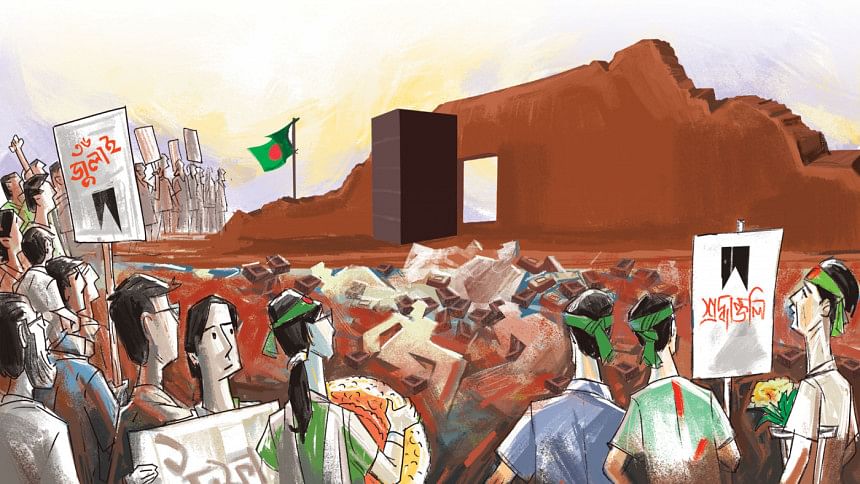Martyrs of Freedom

Over fifty years ago, during the final days of the 1971 war, a significant number of intellectuals—professors, doctors, journalists, and others—were brutally murdered just before the fall of Dhaka, when the Pakistani-occupied forces and their collaborators were on the verge of surrendering. Some of these individuals remain missing to this day, their bodies never recovered after being forcibly disappeared. The death toll could have been much higher, as many survived by sheer luck or by using clever tactics to evade their perpetrators.
These atrocities were not confined to the final stages of the war; the persecution of intellectuals was an ongoing and systematic aspect of the conflict. The brutality began on the night of 25 March, when well-known professors were murdered at Dhaka University, marking the onset of the war as the Pakistani army sought a military solution to the will of the people of Bangladesh. Intellectuals and professors were specifically targeted because they were seen as the torchbearers of Bengali nationalism, actively resisting Pakistan's attempts to suppress it.
The organised killings of intellectuals, carried out in such a systematic manner, were unprecedented in the history of the Indian subcontinent. No prior instances are recorded of teachers being murdered or abducted from any university in the region. While the region had witnessed large-scale violence during the final stages of the 1947 partition, the events of 1971 stand as an unparalleled tragedy in history. Bengal endured the infamous Calcutta riots and their aftermath, while Punjab experienced its own severe violence during the partition, where the population was sharply divided along religious lines—something that was far less pronounced in Bengal. Nevertheless, the targeted killings of intellectuals during the 1971 conflict were without precedent. While intellectuals in the colonial period were not free from divisive politics, with some contributing to religiously charged ideologies, the partition primarily aggravated religious antagonism between Hindus and Muslims. Even amidst the bitter civil strife of those times, intellectuals were not specifically singled out or persecuted.
But why were intellectuals singled out for such systematic extermination? After the Partition, a new sense of hope emerged with the creation of Pakistan. However, it soon dissipated due to the misrule of the Muslim League and the resurgence of communal violence. The language movement, along with the ongoing political and economic oppression by West Pakistan, led to the rise of Bengali nationalism. Educators, writers, and intellectuals were at the forefront of this movement, and their contributions played a central role in shaping the course of history.
During the Pakistani era, the educational landscape in East Pakistan was severely limited, with only five universities, some of which were still in their early stages. Systematic discrimination against Bengalis permeated higher education, with professors often denied adequate resources. Scholarships and grants from the central government were disproportionately allocated to the Eastern wing, while teaching positions were generally less attractive compared to the prestigious roles in government administration. As a result, many young university lecturers left academia after securing positions in the Civil Services of Pakistan (CSP) or the East Pakistan Civil Services (EPCS). However, it was also a time when many individuals chose teaching as a lifelong vocation, becoming the backbone of the region's educational system and playing a crucial role in shaping its intellectual foundation.
Despite the numerous challenges they faced, the 1960s witnessed a remarkable intellectual blossoming in East Pakistan, both nationally and within universities, largely driven by resistance to the prevailing oppression. This era mirrors the British colonial period when Bengal gave rise to monumental figures like Rabindranath Tagore and Kazi Nazrul Islam—two of the most influential intellectuals in the region's history.
Even now, when the brightest minds look back on their academic journeys, they often speak of the 1960s with pride, acknowledging it as a period of intellectual brilliance fueled by dedication and a deep passion for learning. This time also represents a golden age of creativity, marked by exceptional accomplishments in the arts, poetry, literature, cinema, and beyond. It was a period defined by iconic poets, novelists, and artists whose works continue to resonate and inspire new generations.
This remarkable period coincided with a time when political leaders were bewildered and disoriented by the challenges of military rule, the convoluted politics of Pakistan's two wings, and the complexities of international politics. Amidst this turmoil, intellectuals emerged as beacons of hope, striving to define Bengali identity and exposing the regional disparities that disproportionately favoured West Pakistan.
Their search for a clear sense of identity, along with their critical analysis of the national economy, formed the foundation of Bengali nationalism. This movement played a crucial role in the eventual collapse of Pakistan, especially after the Pakistani military waged a brutal war against the unarmed people of East Pakistan in 1971. While it would be inaccurate to label all intellectuals of that time as revolutionaries, many of them did receive recognition or support from the government and industrial figures. Despite their relatively conventional positions, however, many remained steadfastly dedicated to their work, indirectly contributing to the people's cause through their intellectual contributions.
During the 1971 war, many professors and intellectuals found themselves unable to actively engage in the resistance movement, as they were forced to continue their work under the oppressive rule of the military junta. Their lives were marked by a deep internal struggle—while their hearts yearned to support the war effort, personal responsibilities and the harsh realities of the time prevented them from doing so.
Tragically, these individuals became the targets of systematic torture and killings, an atrocity unprecedented in the region's history, aimed at silencing this vital segment of society. Yet, despite this brutal chapter, these intellectuals continue to stand as lasting symbols of wisdom, sacrifice, and freedom, etched into the nation's collective memory.
Priyam Paul is a journalist and researcher.

 For all latest news, follow The Daily Star's Google News channel.
For all latest news, follow The Daily Star's Google News channel. 



Comments